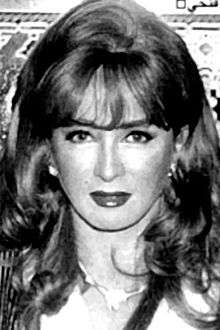Naglaa Fathi
| Naglaa Fathi | |
|---|---|
 Naglaa Fathy in 1980s | |
| Native name | نجلاء فتحي |
| Born |
Fatma al-Zahraa Hussein Fathi December 21, 1948 Cairo, Egypt |
| Occupation | Actress |
| Years active | 1966–2000 |
| Spouse(s) | Hamdi Qandil |
Fatma al-Zahraa Hussein Fathi (Arabic: فاطمة الزهراء حسين فتحي, born 21 December 1948), popularly known as Naglaa Fathi, is an Egyptian actress of Circassian descent.[1] She started her acting career in 1967 and has played a role in over 80 films.[2]
Career
Fathi started her acting career at age 16 when she was approached by producer Adli El-Mawalid, while she was at the beach in Alexandria with her friends. She dropped out of school in 1967 to get involved in acting. Her career began in earnest and she starred in the 1968 film Afrah ("Joys"), produced in Lebanon. The director of the film, Ali Badrakhan had reservations about Fathi, but producer Ramses Naguib saw her as potential romance icon. Throughout the 1970s, she acted in roughly 15 films a year, predominantly romantic dramas. In the Egyptian film industry, she was only second to actress Faten Hamama in the number or romance films acted in. During the 1980s, Fathi largely departed from this role and began acting more complicated roles in movies dealing with a social and political dimension.[2]
She received an award for best actress for her starring role in El Garage (1995),[3] where she played a deserted and impoverished single mother who lives inside a garage with her five children, all of whom she gradually gives up to other families as her health deteriorates. The film was based on a true story and Fathi described it as the "most difficult and painful" role she has had to play.[2] According to writer Nagla El-Baz, the movie was a success in raising awareness about the issue of overpopulation.[4]
Personal life
Fathi had previously been in two marriages and had a daughter named Yasmine with her second husband. In 1992 she married well-known Egyptian journalist and television presenter Hamdi Qandil. While she stated that her first marriage, in 1969, as a secret kept from her family, she described her second marriage in 1971 as a balancing act for her life amid her new fame and fortune and an attempt to raise a large family. She said in a 2000 interview that Qandil, her current husband, "is the first man who has fascinated me. It is not easy to bewitch me, but he did. I feel like a student when I'm with him: I discover new qualities in him every day."[2]
She supports the Palestinian cause and pan-Arabism. When late Egyptian president Gamal Abdel Nasser declared his resignation after the Egyptian defeat in the 1967 War, she joined demonstrations protesting his departure, which he retracted days later. She has wore the traditional Palestinian rural dress during some interviews and public events as an expression of solidarity and said she was deeply distraught by the events of the Second Intifada in the Palestinian territories, particularly the killing of Muhammad al-Durrah, stating "My happiness has been shattered by the events [in the Palestinian territories]. I don't know how to be happy 100 per cent, really. Something inside me has grown dark."[2]
References
- ↑ http://www.radioma3ak.com/news/?tag=ولدت-لوالدين-مصريين-بالجنسية-من-أصل-شر
- 1 2 3 4 5 Abou El-Magd, Nadia (2000-11-22). "Naglaa Fathi: Soft as steel". Al-Ahram Weekly. Retrieved 2013-06-13.
- ↑ The Hollywood Reporter, Wilkerson Daily Corporation, 1995, p. 54, retrieved 2013-06-13
- ↑ El-Baz, Nagla (1997). "Egyptian Cinema and the problem of Child Labour". Ramses College. Retrieved 2013-06-13.